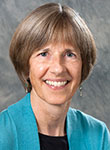Nutrition professionals worldwide crave info via MOOCs
By Blaine Friedlander
In a typical massive open online course, or MOOC, it’s rare if more than 15 percent of registrants actually complete the course. But in a particular MOOC on infant and young child feeding, developed jointly by UNICEF and Cornell, the completion rate is more than double, as nutritionists and other health professionals in developing countries yearn for the latest nutrition information.

“There was an unmet need around the world, so the success of this online course went beyond our expectations,” said Christina Stark, senior extension associate and co-author of the report, “Massive Open Online Courses: How Registered Dietitians Use MOOCs for Nutrition Education,” published in the Journal of the Academy of Nutrition and Dietetics (August 2014). The study, co-authored by Jamie Pope of Vanderbilt University, is the first MOOC-related article in the premier journal in the dietetics and nutrition field, Stark said.
To date, the overall completion rate in the course, based on registrants from 168 countries, has been about 32 percent. In Ethiopia, for example, 40 percent of its 333 registrants completed the course, and in India, almost 38 percent of the 1,150 enrollees finished. But if you base the rate on just active students – those who completed at least one unit – then the average rate goes up to 64 percent.
Registrants have been primarily employed by nongovernmental organizations, hospitals and clinics, UNICEF, universities and governments. Distance education can be a cost-effective and convenient way to provide high-quality continuing professional education, particularly for those in low- and middle-income countries, Stark said.
Conducting a regional, in-person training workshop, which usually includes airfare for some participants, could be 40 times more costly than developing an online training course, the report says. As more people complete an online course, the per-person cost decreases, Stark said. “Here at Cornell, we are fulfilling our vision to serve as a ‘land-grant institution to the world,’” she added.
Cornell NutritionWorks hosts the course, which features Division of Nutritional Sciences professors Kathleen Rasmussen, Rebecca Stoltzfus and Jean-Pierre Habicht (emeritus) lecturing on the basics of infant and young child feeding. UNICEF Headquarters staff and other international experts teach the remaining units related to programming and other key issues.
The course must be completed within three months and features nine lecture units and three case studies. The units include self-check mini-quizzes and unit quizzes that participants must pass before advancing to the comprehensive final exam. Registrants who successfully complete the course earn a personalized certificate for free.
Says Stark: “The new MOOC platforms provide a way to deliver high-quality nutrition education to thousands of individuals worldwide. In addition, experiences from online courses can benefit face-to-face courses on campus.”
Noting the two-way process, she adds: “Lessons learned from a global audience can be incorporated into live offerings.”
Media Contact
Get Cornell news delivered right to your inbox.
Subscribe